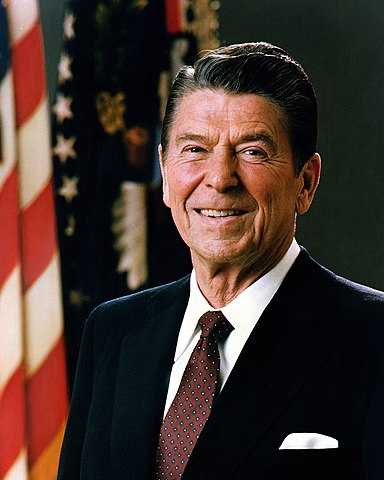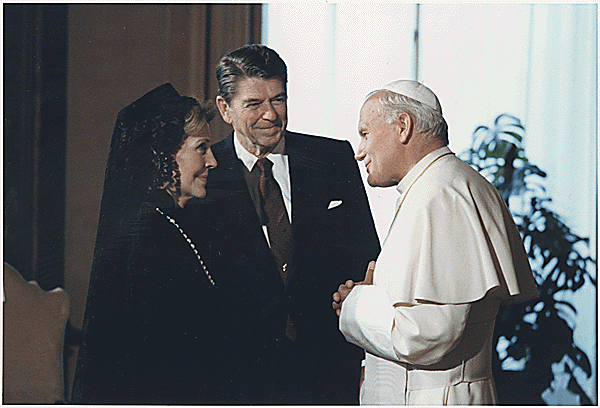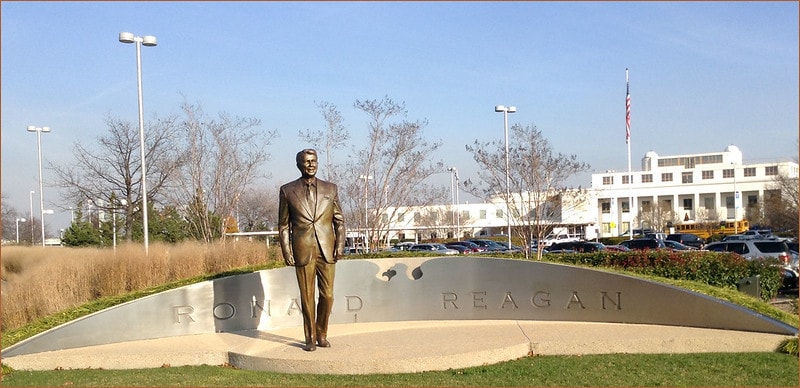Last updated on May 10th, 2021
On January 20th, 1981, Ronald Reagan became the 40th president of the United States of America. Prior to assuming office as the president of the United States, he worked as an actor, a union leader and the 33rd governor of California. During the 1950s, he even worked as a motivational speaker at General Electric factories. Coming from a low income family, he achieved great heights. Having served two consecutive terms as the president of America, he demonstrated that the public had trust in his abilities to take the nation forward on the path of economic development, social justice and equality. Below are some interesting facts about Ronald Reagan’s life covering his early years, presidency and post-presidency.
Early Life, Family, Education
1. Ronald Wilson Reagan, 40th President of the United States, was born on February 6, 1911 in Tampico, Illinois to parents Nelle Clyde Regan (née Wilson) and John Edwards “Jack” Reagan.
2. Ronald was the younger son of Nelle and Jack. His brother, Neil, chose advertising as his profession and later became an advertising executive. The majority of US presidents were middle children. Firstborn kids made up the second largest group among the 44 commanders-in-chief.
3. During Ronald’s early years, the Reagan household was often beset with financial worries—chiefly due to his father’s drinking habits. A shoe salesman, Jack Reagan had often had difficulties holding on to his jobs and in addition, his alcoholism incurred extra expenses so that Ronald’s mother had a hard time of it managing the family finances.

4. Despite this, Jack Reagan was known to be of a cheerful disposition and he was a gifted raconteur, to boot. Many believe that the future president inherited his exceptional skills as an orator as well as his penchant for quips and quick repartees mainly from his father.
5. Notwithstanding his alcoholism, Jack Reagan was known to be affectionate to his sons. The young Ronald got the nickname ‘Dutch’ from his father, the moniker that will stay attached to him throughout his career as an actor and a media person and later, as a prominent political figure.
6. However, according to Reagan’s own admission, his mother played the most important role during his growing years. A firm believer in the innate goodness of people, Nelle instilled solid working class values and ethics in his son and these would stand the latter in good stead throughout the rest of his life.
7. Reagan later wrote that it was due to his mother, a strong believer and a regular attendee to the Disciples of Christ church, that he became a Protestant Christian, despite the fact that his father was of the Roman Catholic faith.
8. Ronald also credits his mother for inspiring him to adopt an open and generous attitude towards people and life in general.
9. Both Ronald’s parents were against the practice of racial discrimination. His father opposed the Ku Klux Klan for their anti-black racism and for their anti-semitism. Once, while he was in college, Reagan invited two black teammates from his college football team to stay in their house since the boys were not allowed to stay in the local hotel where the football team was residing.
10. Reagan later maintained that, despite the financial difficulties and other minor problems (including his father’s drinking habit), the childhood years he spent with his family were the happiest time in his life.
11. As a highschooler, Ronald developed interests in various sports as well as in acting. Having finished school, he went to attend Eureka College where he soon became popular among students thanks to his diverse extracurricular activities.
12. Did you know that Reagan worked for a construction contractor and dug ditches ten hours a day, six days a week? For the task, he was paid 35 cents per hour. He used the money he saved from this work for paying his college tuition.
13. He was a member of the college’s gridiron football team, the captain of the college swim team and, thanks to his acting skills, a highly valued member of the college theater group. In addition, he played an active role in the campus politics. Although an indifferent student, all these various activities earned him immense popularity and he was elected student body president in his senior year.
Early Career, Acting, Fame, Military Service
14. Already after finishing high school, Ronald had started working on his first job as a lifeguard at Lowell Park in Illinois. During his six years at the job, he was known to have performed 77 rescues.
15. However, after having graduated from college in 1932 with economics and sociology majors, Reagan started working as a sportscaster first at the WOC station in Davenport and later in Des Moines at the station WHO.
16. He excelled in his role as a popular sportscaster, especially for his coverage of the Chicago Cubs baseball games and was affectionately named “Dutch Reagan” by the supporters of the team.
17. In 1937, following a successful screen test, he signed a contract with Warner Bros. Studio and moved to California. For the first few years, he appeared mostly in a series of ‘B’ movies where he was almost always cast as the unmistakable “good guy”—affable, sincere, easygoing; in fact, not too different from how Reagan himself was in real life.
18. His first noticeable role came in the film Knut Rockne, All American; in the film, Regan portrays a football player named George “The Gipper” Gipp. The film became a hit and after the “Dutch”, yet another nickname came to get stuck with Reagan, “The Gipper.”
19. Regan’s film career spanned almost three decades during which he appeared in 53 films. His first real hit came with the 1942 film King’s Row whereas the last time he appeared in a film was in 1964, in the movie The Killers. The only movie actor ever to become president.
20. Reagan’s film career was briefly interrupted when he was drafted for military service during World War II. Reagan worked as part of an army film unit based in L.A. He never went abroad or took part in actual combat.
21. One interesting thing related to Reagan’s military service was that after the end of the war, Warner Brothers tried to portray him as a ‘real soldier’ through magazine photos and newsreels where the actor was made to act out scenes such as ‘coming home on leave’ or ‘going off to war.’
22. However, Reagan himself, once he left Hollywood, was in the habit of recounting tales of how happy he felt after coming back from war…and so on. Since he never ‘went to war’ in the first place, many of his detractors claim that episodes such as this demonstrate a basic lack of regard in Reagan for the truth.
Marriage, Children, Screen Actors Guild, Entry into Politics
23. Reagan met his first wife, Jane Wyman, in 1938 at the sets of the film Brother Rat. The two tied knots two years later in 1940. The couple had two daughters, Maureen (born in 1941) and Christine (born in 1947 but who died only a day after her birth). In between the birth of the two daughters, the couple, in 1945, had also adopted a son, Michael.
24. The marriage, however, culminated in divorce as the couple parted their ways in 1948. Thus, 32 years later, when Reagan assumed the U.S. presidency, he became the first U.S. president with a history of divorce. After having lost their second child (Christine), because Reagan had to serve in the military, his relationship with his wife crippled further. “Perhaps I should have let someone else save the world and saved my own home,” Reagan said once.

25. A year later, Reagan met Nancy Davis, a little-known actress at that time, and soon enough, both developed a fondness for each other. The couple got married in a surprisingly simple and sparse ceremony three years later in 1952.
26. The only guests at their marriage were the best man William Holden and Brenda Marshall, who fulfilled the role of the matron of honor. Many surmise that the ceremony was so sparse at least partly due to Reagan’s decision to cooperate with the House of Un-American Activities Committee in the blacklisting of writers, directors and actors who were suspected of communist or leftist sympathies.
27. In fact, it was revealed, almost four decades later after the incident, that both Ronald and his then wife Jane acted as FBI informants in late 40s and supplied FBI with names of the actors they suspected to be communist sympathizers. As an informant, Regan’s code name was T-10!
28. Ronald and Nancy Reagan had two children: daughter Patti (born 1952) and son Ron (born 1958).
29. The marriage with Nancy heralded a happy and peaceful chapter in Regan’s life. The relationship was based on mutual fondness and respect and the couple is known to have stayed close and intimate all through their married life.
30. Many also credit Nancy Reagan for her husband’s highly successful political career; since many believe that Nancy’s conservative political views played an important role in Reagan’s (who up to that point was a Democrat) switching his allegiance to the right.
31. The only film in which Ronald and Nancy Reagan appeared together was Hellcats of the Navy, a war movie made in 1957.
32. Not many people know this, but it has come to light in the recent years (thanks to the book Movie Nights With the Reagans by Mark Weinberg, the former president’s press secretary) that Regan was actually upset about never winning OSCARS. Although he never publicly voiced his discontent regarding this, Ronald felt that he was at least entitled to an honorary award n the behalf of the Academy.
33. There is not much to say about the 1951 film Bedtime for Bonzo, except maybe the fact that the film could have turned fatal for the nation’s future president. Once during the shooting of the film, (where Reagan plays a psychology professor bent on teaching human morals to a chimp) the chimp Peggy got overly interested on Reagan’s tie and started to pull on it with all his might. Fortunately, members of the crew came to the rescue of the hapless actor in time, i.e., before he gave up the ghost!
34. Many see Reagan’s role as the president of the Screen Actors Guild (SAG) having played a crucial part in Reagan’s decision to enter high politics.
35. His ardent crusade against any communist infiltration in SAG and the stubbornness he had shown to break all resistance and sometimes violent strikes was of a similar character when decades later, as the president, he with the same ruthlessness suppressed the PATCO strike and fired more than 11,000 air traffic controllers who went on strike.
36. From around mid-60s, Reagan started snacking on jelly beans as part of his effort to give up pipe-smoking. His favored manufacturer was Goelitz Candy and once the latter rolled out their Jelly Belly line, Ronald promptly switched to the ‘bellies’. His favorite flavor? Licorice!

Decision to Run for President
37. In 1966, Reagan became the governor of California by defeating the Democrat incumbent Edmund G. Brown by a margin of close to one million votes.
38. During his two terms at the office of governor, Reagan implemented high tax increases and instituted radical reforms vis-à-vis the welfare programs of the state. These measures proved effective in erasing substantial budget deficits from the Brown era.
39. This success made Reagan believe that he can stable the then highly volatile and inflation-stricken American economy by implementing the same measures if he gets elected as the president.
40. As such, Reagan virulently criticized Gerald Ford’s appointments and policies running into the primary elections in 1976. However, he still lost the nomination by sixty votes.
41. In 1980, he was finally successful in winning the Republican ticket by defeating George Bush Sr., whom he subsequently chose as his running mate. In the presidential election, he easily defeated a highly vulnerable incumbent in the form of Jimmy Carter, who was then reeling under factors like high unemployment, increased inflation and finally, the Iran hostage crisis.
. . . continue reading on the next page
